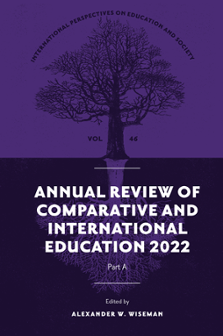
Index
Annual Review of Comparative and International Education 2022
ISBN: 978-1-83753-739-6, eISBN: 978-1-83753-738-9
ISSN: 1479-3679
Publication date: 14 December 2023
Citation
(2023), "Index", Wiseman, A.W. (Ed.) Annual Review of Comparative and International Education 2022 (International Perspectives on Education and Society, Vol. 46A), Emerald Publishing Limited, Leeds, pp. 235-244. https://doi.org/10.1108/S1479-36792023000046A020
Publisher
:Emerald Publishing Limited
Copyright © 2024 Alexander W. Wiseman
INDEX
(see also Higher education (HE))
- Prelims
- Chapter 1: 10 Years of Reflection on the Field of Comparative and International Education: What Difference Does it Make?
- Part 1. Comparative Education Trends and Directions
- Introduction to Part 1: Comparative Education Trends and Directions
- Chapter 2: Trends and Directions in the 2020 Annual Review of Comparative and International Education (ARCIE): A Meta-analysis
- Chapter 3: International Mobility of Academics: Science Mapping the Existing Knowledge Base
- Chapter 4: Dilemma Between Internationalization of Higher Education and Japanese Language Education: Outcomes and Issues of the Plan to Accept 300,000 International Students
- Chapter 5: The Impact of University Education on Regional Development: A Comparative Study of Kenya, Uganda, and Tanzania
- Chapter 6: What's in a Wave? The Content of Neoliberal Education Reforms, 1970–2018
- Chapter 7: Language and Employability in Higher Education Research: A Scoping Review
- Chapter 8: International Education from Theory to Practice: A Literature Review
- Chapter 9: Adaptation, Decolonization, and Integration: Oceania and Global Trends
- Chapter 10: Underwhelmed by Research in Comparative and International Education
- Part 2. Conceptual and Methodological Developments
- Introduction to Part 2: Conceptual and Methodological Developments
- Chapter 11: Fieldwork with Depth: Its Implication and Future Directions of Comparative Education Research in Japan
- Chapter 12: An Inevitable Phenomenon: A Bibliometric Analysis of Shadow Education Research (1982–2022)
- Chapter 13: Neo-statism and Comparative Research in Higher Education: Experience from Hong Kong
- Index